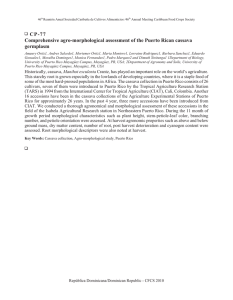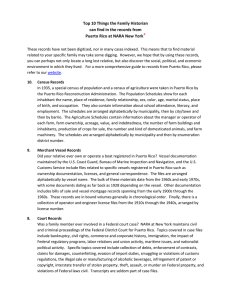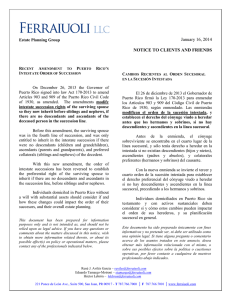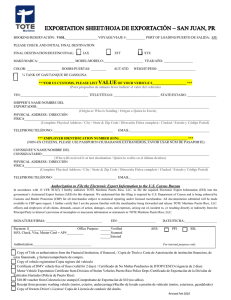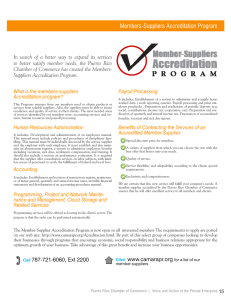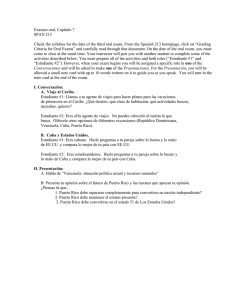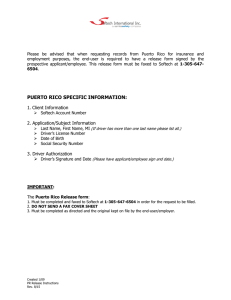Culebra - UPR.edu
Anuncio
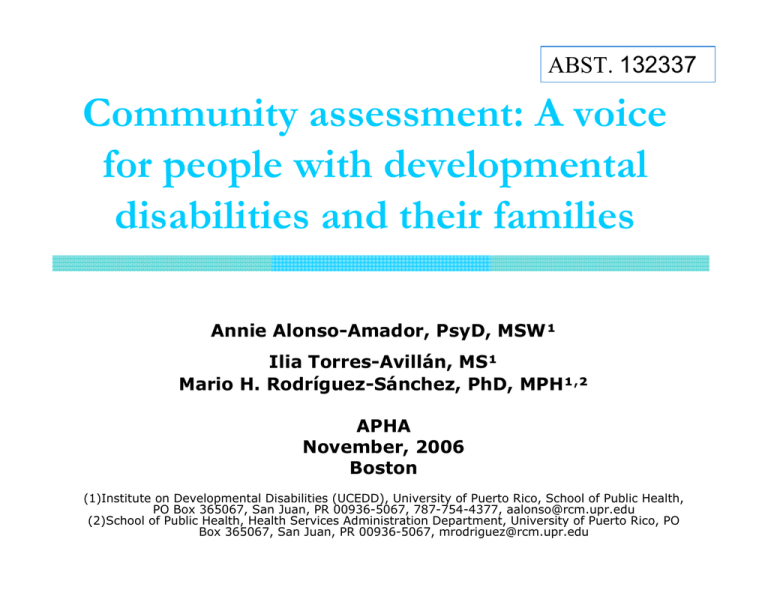
ABST. 132337 Community assessment: A voice for people with developmental disabilities and their families Annie Alonso-Amador, PsyD, MSW¹ Ilia Torres-Avillán, MS¹ Mario H. Rodríguez-Sánchez, PhD, MPH¹,² APHA November, 2006 Boston (1)Institute on Developmental Disabilities (UCEDD), University of Puerto Rico, School of Public Health, PO Box 365067, San Juan, PR 00936-5067, 787-754-4377, [email protected] (2)School of Public Health, Health Services Administration Department, University of Puerto Rico, PO Box 365067, San Juan, PR 00936-5067, [email protected] Introduction Needs assessment in the developmental disabilities (DD) population in severely underserved areas facilitates the planning of services. The island municipalities of Vieques and Culebra in Puerto Rico represent two communities with extreme difficulties in access to services. This study investigated the social and health needs of the DD population and their families in Vieques and Culebra. Findings will support people with DD in obtaining the most appropriate social and health services in the least restrictive environment Introduction An increasing number of families who have members with DD present the need to produce a system change in order to have easy access to comprehensive family support services. Individuals with DD require a broader range of services throughout their life span, assisting them to achieve independent living and employment with the most appropriate services in the least restrictive environment. Introduction Family research shows that family functioning is affected by several factors such as: social context and life span. Study results show that social supports allow families to cope under stress, helping them to adapt to situations that challenge family organization. Although families with economic strains are in more emotional distress and vulnerable to crisis, the presence and acknowledgement of family and community resources help them cope in adverse situations. To support families it is essential to hear the families’ voices about their needs and vision about the future. Benefits of a Needs Assessment A needs assessment makes the projects defensible, fundable and measurable. A needs assessment targets resources. A needs assessment can reenergize existing efforts. A needs assessment can help garner media attention. A needs assessment is an opportunity to take a fresh look at the problem and determine whether old programs can be scrapped and new ones begun or whether programs are working well and should be replicated. A needs assessment is a good strategy for involving various members of a coalition or organization in important activities. Community Assessment Model for People with Developmental Disability Public Health and Private Health Infrastructure Populations Families, Aggregates People with DD Neighborhoods, Communities Public and Private Social and Human Services Infrastructure Adapted from Issel (2004) Need Assessment Areas: Percent of Persons with Disability five years old or older Percent of Persons with Disability five years old or older 26.8% 29.5% 26.7% Percent of Families under level of poverty Puerto Rico Vieques Culebra Puerto Rico Vieques Culebra 44.6% 60.6% 33.0% Source: US Census Bureau, 2000 METHODS Sample Instrument Convenience 73 families 44 Vieques Sociodemographic questions Family Needs Scale 29 Culebra (Adapted from Bailey et al. 1988) Procedure Personal Interview Characteristic of the Sample Vieques Culebra Gender Female Male Gender 84.1 % 15.9% Age < 20 years 21-30 years 31-40 years 41-54 years 55 years and older Female Male 89.7 % 10.3% Age 3.7% 18.2% 20.5% 31.8% 27.3% < 20 years 21-30 years 31-40 years 41-54 years 55 years and older 0% 17.2% 44.8% 27.6% 10.3% Characteristic of the Sample Vieques Culebra Participant Mother Father Family Members Persons with DD Other Participant 61.0% 2.0% 14.0% 2.0% 2.0 Medicaid Managed Care Fee for Service Mother Father Family Members Persons with DD Other 7 2.0% 0% 7.0% 14.0% 4.0% Health Coverage Health Coverage 68.2% 31.8% Medicaid Managed Care Fee for Service 66.7% 33.3% Characteristic of the Sample Culebra Vieques Employment Full Time Housewife Disability Retired Unemployed/Partial Employment 21% 27% 21% 5% 27% Marital Status Married Single Other Full Time Housewife Disability Retired Unemployed /Partial 48% 20% 17% 0% 14% Marital Status 45% 41% 14% Married Single Other 31% 38% 31% Characteristic of the Sample Vieques Culebra Education < High School High School > High School Education 41% 41% 18% Income monthly < $500 $500 to 1,000 $1,101 to 2,000 > 2,000 Family Members Mean: 4 < High School High School > High School 54% 32% 14% Income monthly 37% 40% 18% 5% < $500 $500 to 1,000 $1,101 to 2,000 > 2,000 Family Members Mean: 4 35% 39% 22% 4% Family Needs Survey Adapted from Bailey & Simeonsson, 1988 Measure functional needs of families of children with disabilities Contains 35 items categorized into six subscales Three Response choices Definitely do not need help with this Not Sure Definitely need help with this RESULTS Community IssuesVieques Knowledge about Community Services Yes 41% Quality of Services for families with members with DD: Excellent Good Regular Poor Do not exist 9.5% 19.0% 9.5% 42.9% 19.0% Believe that Families with DD members in Vieques are organized 22% Believe Training will promote changes in Vieques 86% RESULTS Community IssuesCulebra Knowledge about Community Services Yes 31% Quality of Services for families with members with DD: Excellent Good Regular Poor Do not exist 23.1% 30.8% 7.7% 15.4% 23.1% Believe that Families in Culebra with DD members are organized 32.1% Believe Training will promote changes in Culebra 89.3% Family Community Assessment Information Social Support Explaining to others Community Services Financial Need Family Functioning Alpha Scale Value: .90 Mean SD Alfa 8.7 5.9 2.5 4.5 5.8 3.4 4.06 4.03 2.39 3.87 4.90 2.80 .75 .80 .73 .78 .81 .72 Family Community Assessment Percent of Families that do not need help in : Information Social Support Explaining to others Community Services Financial Needs Family Functioning 4.1 10.9 36.0 17.8 21.0 27.4 % % % % % % Logistic Regression Model Dependent Variable: Family Functioning Independent Variables: Health Plan, Sex, Family members, Education, Subscales (Information, Social Support, community services, financial needs, explain to others) Significant Predictors Social Support ( p < .021) Financial needs (p < .017) Conclusion The population with DD presents complex family needs related to health and social services. Both islands are underserved communities with special planning needs related to family functionality.

